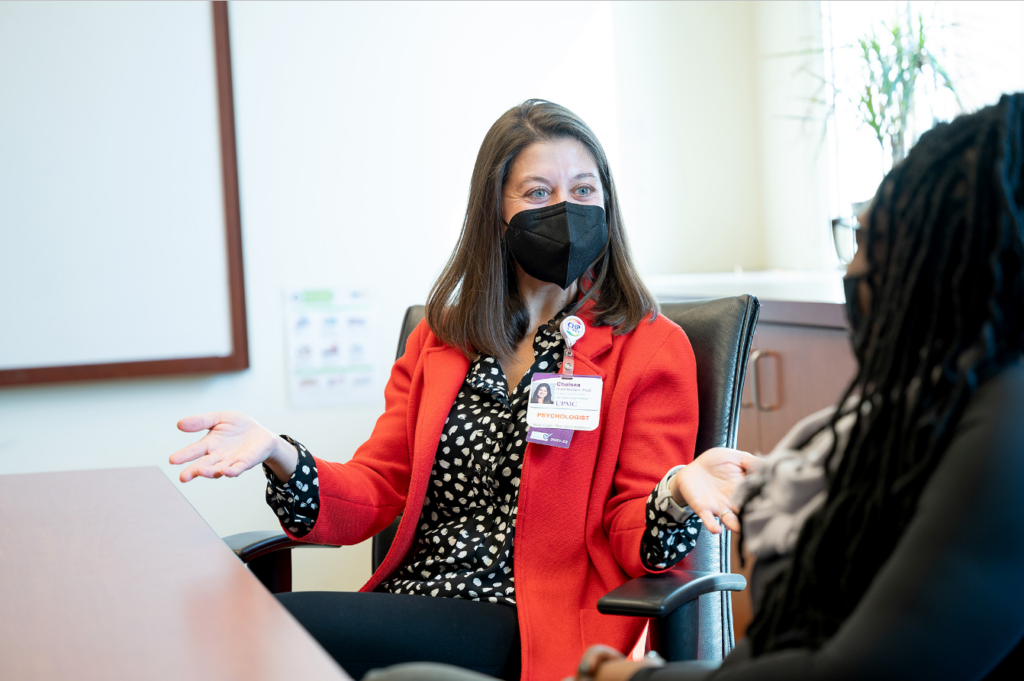As a parent, it can be challenging to know how to talk to your children about gun violence and safety. It’s a difficult topic, and many parents may feel ill-equipped to have such talks with their children. However, it’s important to have these discussions to help them feel safe and secure in a world that can sometimes be unpredictable. In this July 2022 article in UPMC HealthBeat, Chelsea N. Grefe McCann, PsyD, Grefe McCann, PsyD, a child psychologist who serves as the Program Director for UPMC Children’s Behavioral Science Division, explains how to talk to kids about gun violence.
Here are some quick tips from the article to help guide your conversation.
Be mindful of your own reaction
As adults, we often have strong emotional reactions to mass shootings or gun violence. It’s important to be mindful of your own reaction because your children will take their cue from you. If you’re visibly upset or anxious, your children may become anxious or fearful themselves. It’s okay to acknowledge your feelings, but try to remain calm when talking to your children.
Limit kids’ exposure to media, TV, podcasts, and conversations
While it’s important to stay informed, too much exposure to media coverage about mass shootings or gun violence can be overwhelming and anxiety-provoking for children. A great way to limit their exposure is to monitor your own use of media, including in the car. If they do hear about it, calmly provide them with accurate information.
Keep to your household’s regular routines
Children thrive on routine and structure, and it’s important to maintain your household’s regular routines, schedules, and rules as much as possible. This can help your children feel safe and secure in a world that can sometimes feel chaotic and unpredictable. Try to maintain your regular meal times, bedtimes, and other routines, and continue to enforce your household rules and expectations.
Allow conversations to happen naturally
Children may need time to process information about gun violence and bring it back home before they’re ready to talk about it. Be patient and available, and let your children know that you’re there to answer any questions they may have. Encourage your children to share their thoughts and feelings with you, and validate their emotions.
“Allow your child to ask questions,” says Dr. Grefe McCann. “Kids might have very specific questions that you can answer to reassure them, but it’s also ok for parents to say, ‘I don’t know.’”
Offer reassurance
Finally, it’s important to offer reassurance to your children. Let them know that you’re there to keep them safe and that there are many people who are working to make the world a safer place. Reassure them that while bad things do happen, there are many helpers in the world.
Some children may ask questions regarding school shooter drills or express worry about school shootings. “Know your school’s safety response,” adds Dr. Grefe. “Find out the specific steps your school has taken to keep kids safe, such as closed vestibules, lockdown drills, and safety procedures. Make sure kids know to call 911 and that police will come. Many schools may also have security officers to help keep them safe.”
For more information, listen to the That’s Pediatrics podcast, where Dr. Grefe McCann discusses the epidemic of gun violence in the United States and its effects on children. She is joined by former UPMC Children’s psychiatrist, Cristin McDermott, MD.
As Drs. Grefe McCann and McDermott share in the podcast episode, gun violence has become the number one cause of death in children and adolescents from infancy through age 19. The worst response is not to talk about it, Dr. Grefe says. “If kids have questions and we don’t answer them, we’re sending the message that we shouldn’t talk about these things. Then kids may get an even worse image in their minds than the real situation.”
Through the Injury Prevention Program, community partnerships, and educational resources like That’s Pediatrics, UPMC Children’s is committed to the promotion and education of safe gun storage and supporting the mental and emotional health of those affected by gun violence.

